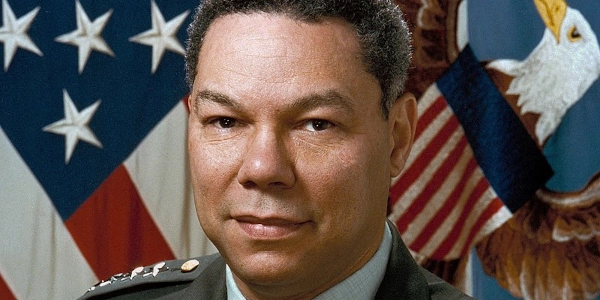Click here to Sponsor the page and how to reserve your ad.
-
Timeline
1989 - Detail
August 10, 1989 - Army General Colin Powell is elevated to the position of Chairman of the Joint Chiefs of Staff, becoming the first African American to be nominated to that post.

Colin Powell would become the 12th Chairman of the Joint Chiefs of Staff, the first African American to hold that position. Appointed by President George Herbert Walker Bush on August 10, 1989 to succeed Admiral William Crowe as of October 1, Powell would serve the President Bush and President Clinton administrations for four years, until September 30, 1993. He was a four star general when he was selected, given that distinction in April 1989. His most recent position had been as Commander in Chief of Forces Command (CINCFOR), Fort McPherson, Georgia, where his duties made him responsible for the general reserve of United States based Army forces. Before that he had been the National Security Advisor to President Ronald Reagan.
General Colin Powell's firsts were much larger than just that of being African American. He was the youngest, at 52, chairman in history. He was also the first who had been an ROTC graduate.
During his years of service there had been many successes and a few debates about his policies. He served in that position at the end of the Cold War during a period where he introduced a policy focusing on regional and humanitarian crises and not based against the Soviet Union. He oversaw a reduction in the Armed Forces approaching twenty-five percent. He brought in reforms that better aligned the branches of the armed forces together, instead of as separate units.
There would be twelve deployments during the Powell chairmanship. The Panama crises with dictator Manuel Noriega began with an attempted coup two days into his tenure. That crises turned into an operation to oust him in December after the death of an American officer and declaration of war against the United States by Noriega. Twenty-seven thousand troops were involved in the defeat of Noriega and his Panamanian regime.
His largest deployment was in response to Iraq's invasion of Kuwait in August 1990, and President Bush's decision to send two hundred and fifty thousand troops to the region to prompt Saddam Hussein to leave Kuwait or face consequences. In January 1991, Operation Desert Storm of the Persian Gulf War was launched upon Hussein's refusal, and Powell's tactic of maximum force created an outcome of quick defeat of the Iraqi Army.
General Powell, as Chairman of the Joint Chiefs of Staff, during both the Bush and Clinton administrations, took both a military and policy development role, which has been critized by some scholars and military history experts.

Life Before Becoming Chairman
Colin Powell was born on April 5, 1937 in New York City and grew up most of his life in the South Bronx. He enrolled in the City College of New York at the age of sixteen, and joined the Army Reserve Officer Training Corps (ROTC). Powell flourished, attaining the highest ROTC rank of cadet colonel. He graduated in 1958 with a B.S. in geology, and gained a commission in the Army as a 2nd lieutenant.
He became a platoon leader in West Germany, commanded the 5th infantry division at Fort Devens, and was promoted to captain in 1962. In 1962-3, he was stationed in South Vietnam as an advisor to the South Vietnamese. Powell was wounded, and recieved a Purple Heart for his bravery. While back in the states, Powell attended the Command and General Staff College, graduating second in his class of one thousand two hundred and forty-four in 1968. This achievement sent him back to Vietnam in a variety of capacities, including Assistant Chief of Staff, Operations G-3 for the 23rd Infantry Division.
Once returning to Washington, Powell graduated with a master's degree in business administration from George Washington University. By 1972, he was a lieutenant colonel and working at the Office of Management and Budget as Special Assistant to the Deputy Director. Later he would return to combat activities in the Demilitarized Zone of Korea. These positions brought Colin Powell into close contact with those with more experience, who were impressed with his multi-faceted educational and combat journey. By 1979, he was a Brigadier General.
In 1983, General Powell returned to the Pentagon as an assistant to Defense Secretary Caspar Weinberger.

Career After Chairmanship
Although it would seem that Powell had reached a zenith with his positions to date, 2001, he was named the 65th United States Secretary of State under President George W. Bush. Powell would serve in that capacity for four years. It was again a measure of first; the first black Secretary of State, but his most important role in that capacity was organization of nations after the Terrorism Acts of 2001 to catch and combat the roles of al-Queda, its leaders, and their associations with the Taliban in Afghanistan and other terrorism states.
Secretary Powell is now criticized for building the case for a second invasion of Iraq based on, what would later be known, as incorrect military intelligence. Powell favored a diplomatic solution and use of the United Nations to accomplish the goal, but backed President Bush on the ultimate decision. Iraq did not have Weapons of Mass Destruction, which was the foremost reason why the United States and its coalition went to war in 2003.
Photo above: Official portrait of General Colin Powell as Chairman of the Joint Chiefs of Staff (cropped), 1989, Russell Roederer, U.S. Army. Courtesy Wikipedia Commons. Photo below: President Bill Clinton with Generals. Standing, left to right: Admiral Frank Kelso, General Gordon Sullivan, Chairman of the Joint Chiefs of Staff General Colin Powell, President Clinton, Secretary of Defense Les Aspin, Admiral David Jeremiah, General Merrill McPeak, and General Carl Mundy, Jr, 1993, White House Photo. Courtesy Library of Congress. Info source: Library of Congress; Joint Chiefs of Staff; Wikipedia Commons.






